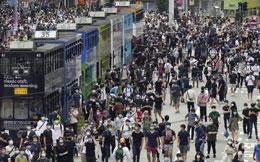Protests return to the streets of Hong Kong

Beijing has vowed to force controversial national security laws on Hong Kong “without the slightest delay” as police in the semi-autonomous territory fired teargas at protesters demonstrating against the unprecedented decision.
Speaking in Beijing, China’s foreign minister, Wang Yi, said enacting the proposed anti-sedition law to stop anti-government protests that have persisted for the past year had become a “pressing obligation”.
“We must get it done without the slightest delay,” he said.
Wang said a legislative process to write the details of the law would begin after a proposed decision is approved next week at China’s National People’s Congress (NPC), known as the country’s rubber-stamping parliament where delegates pass already approved policies.
As thousands of protesters in Hong Kong defied social distancing orders and confronted riot police last Sunday, Wang attempted to assuage concerns about how the law could be used against protesters, media and any critics of the government.
“The decision targets a very narrow set of acts that seriously jeopardize national security,” Wang said. “It has no impact on Hong Kong’s high degree of autonomy and the rights and freedoms of Hong Kong residents or the legitimate rights, interests of foreign investors in Hong Kong.”
Last Thursday, China’s NPC made the announcement that it would force a law banning subversion, separatism, and acts of foreign interference on Hong Kong – in what critics and legal observers say is one the most blatant violations of the “one, country, two systems” framework since the handover of Hong Kong from UK to Chinese control in 1997.
Hong Kong’s main stock index dropped 5.6% as details of the looming law were released while countries around the world condemned the decision. The laws, to be directly added into Hong Kong’s de facto constitution without consideration by the local legislature, would allow for Beijing to install “national security agencies” in the city.
In response to questions about investor confidence in the Asian financial hub, Wang said: “Instead of becoming more worried, people should have more confidence in the future of Hong Kong.”
Wang said the laws “will improve Hong Kong’s legal system, bring more stability, stronger rule of a law and a better business environment”.
Beijing’s decision has further worsened US-China ties, already at record lows as Washington claims China is to blame for the coronavirus pandemic.
Describing the national security laws as a “death knell” for Hong Kong’s autonomy and political freedoms, the US has threatened to revoke the territory’s special economic and trade status. On Sunday Wang said: “It is unfortunate a political virus is also spreading in the US, jumping at any opportunity to attack and slander China. There are those in the US pushing the two sides to the brink of a new cold war.
Many Hong Kong citizens feel the new laws would infringe on the freedoms widely enjoyed by the semi-autonomous city as it would allow Chinese companies to set up security agencies.
Protesters, who can currently be arrested and fined for flouting social distancing laws, as well as for illegal assembly, may soon also be charged with "local terrorism" under the new national security law if it is passed by Beijing.
International human rights organizations say the laws would mean the end of the "One Country, Two Systems" principle, the 1997 understanding implemented when Britain handed control of the city back to China which left Hong Kong a degree of autonomy.
The Hong Kong pro-democracy movement had previously fizzled as arrests mounted and, later, large gatherings were banned to stop the coronavirus.
More than 8,300 people have been arrested since the protests erupted last year. Around 200 were detained during small rallies at malls on Mother's Day earlier this month.
Hong Kong residents enjoy rights -- including freedom of speech -- unseen on the mainland as part of the agreement that saw the British colony handed back to China in 1997, and the city has its own legal system and trade status.
Fears had been growing for years that Beijing was chipping away at those freedoms and tightening its control on the city, and campaigners have described the new proposal as the most brazen move yet.
Of particular concern is a provision allowing Chinese security agents to operate in Hong Kong, and that they could launch a crackdown against those dissenting against the mainland's Communist rulers.
"I'm very scared, but I still have to come out," said protester Christy Chan, 23.









